Vitamin D3 from Lichen and Cholecalciferol Differences
Table of Contents
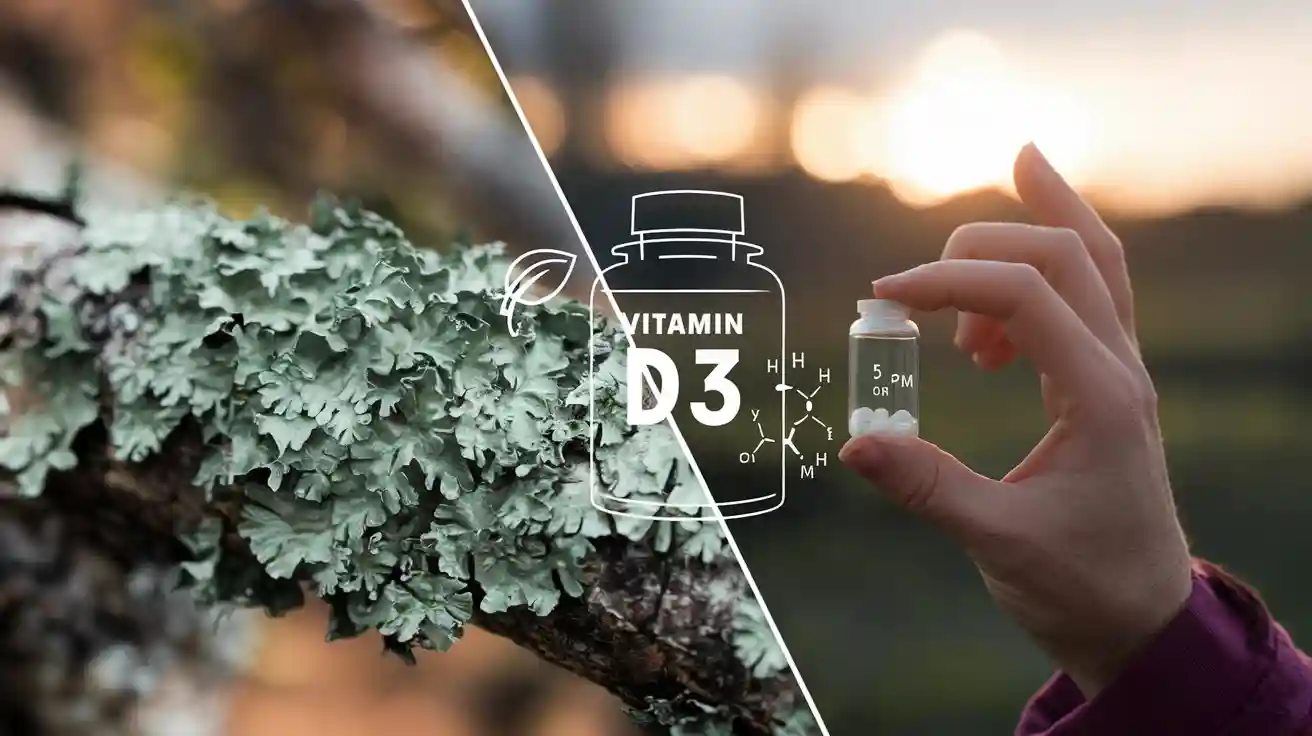
The main difference between Vitamin D3 from Lichen and traditional cholecalciferol comes down to their source. You get Vitamin D3 from Lichen in a vegan-friendly way, while most cholecalciferol comes from animal products. This matters because your diet and values may affect your choice. Many people who follow plant-based diets struggle with low vitamin D. For example, studies show that up to 67% of vegans have a deficiency, which is much higher than in meat-eaters. You might wonder about absorption, ethical choices, or which type works best for your needs.
Key Differences
Overview
When you look at vitamin D3 supplements, you might notice two main types: vitamin d3 from lichen and cholecalciferol. These two options have some important differences that can help you decide which one fits your needs best.
- Vitamin d3 from lichen comes from a plant-like organism called lichen. This makes it a great choice if you follow a vegan or vegetarian diet.
- Cholecalciferol usually comes from lanolin, which is a substance found in sheep’s wool. Because of this, it is not suitable for vegans.
- Both types offer the same form of vitamin D3, which your body absorbs well. Studies show that lichen-based D3 works just as well as the animal-based kind.
- If you care about the environment, you might like that lichen-based D3 is more eco-friendly. It does not rely on animals or animal farming.
- One thing to keep in mind is cost. Lichen-based D3 costs more to produce, so you might see higher prices for these supplements.
- Some people think only animals can make vitamin D3, but that is not true. Lichen can make it, too!
💡 Tip: If you want a vegan, sustainable, and effective vitamin D3, lichen-based options check all the boxes. If you want a more affordable choice and do not mind animal sources, cholecalciferol is common and easy to find.
Comparison Table
Here is a quick table to help you compare the two types side by side:
| Feature | Vitamin D3 from Lichen | Cholecalciferol (Lanolin-Derived) |
|---|---|---|
| Source | Lichen (plant-based) | Sheep’s wool (animal-based) |
| Vegan-Friendly | Yes | No |
| Bioavailability | High | High |
| Environmental Impact | Low (sustainable) | Higher (animal farming involved) |
| Cost | Higher | Lower |
| Common Use | Vegan supplements | Most standard supplements |
| Registered with Vegan Society | Yes | No |
You can see that both types give you the same health benefits. The main differences come from where they come from, how they affect the planet, and how much they cost. If you want a supplement that matches your values, this table can help you choose.
Vitamin D3 Basics
What Is Vitamin D3?
Vitamin D3 is a nutrient your body needs to stay healthy. You get it from sunlight, food, or supplements. Your skin makes vitamin D3 when you spend time outside in the sun. Some foods, like fatty fish and fortified milk, have vitamin D3, but not everyone eats these foods. If you follow a vegan diet, you might look for vitamin d3 from lichen as a plant-based option.
Vitamin D3 helps your body in many ways. Here are some important roles:
- Supports strong bones by helping your body absorb calcium.
- Boosts your immune system so you can fight off germs.
- Keeps your muscles working well.
- Helps your nerves send messages.
If you do not get enough vitamin D3, your body cannot work as it should. You might feel tired or get sick more often.
Why It Matters
You need vitamin D3 every day to stay healthy. Health experts say that not getting enough can cause serious problems. In kids, low vitamin D3 can lead to rickets, which makes bones soft and bendy. Adults can get osteomalacia, a painful bone problem. Long-term deficiency may cause osteoporosis, which makes bones weak and easy to break. Low vitamin D3 also raises your risk for diabetes, heart disease, and some cancers.
Here is a table showing what can happen if you do not get enough vitamin D3:
| Health Consequence | Description |
|---|---|
| Rickets | Soft, bent bones in children. |
| Osteomalacia | Painful, weak bones in adults. |
| Osteoporosis | Weak bones and higher fracture risk. |
| Increased cancer risk | Higher chance of common cancers. |
| Autoimmune diseases | More likely to get diseases like MS or type 1 diabetes. |
| Hypertension and heart disease | Possible link to heart problems. |
| Diabetes risk | Higher risk for type I and type II diabetes. |
| Multiple sclerosis | Linked to low vitamin D3. |
| Age-related macular degeneration | Eye problems as you get older. |
| Infectious diseases | Easier to catch colds and other infections. |
You might wonder how much vitamin D3 you need. The amount depends on your age. Check out this chart to see the recommended daily intake:
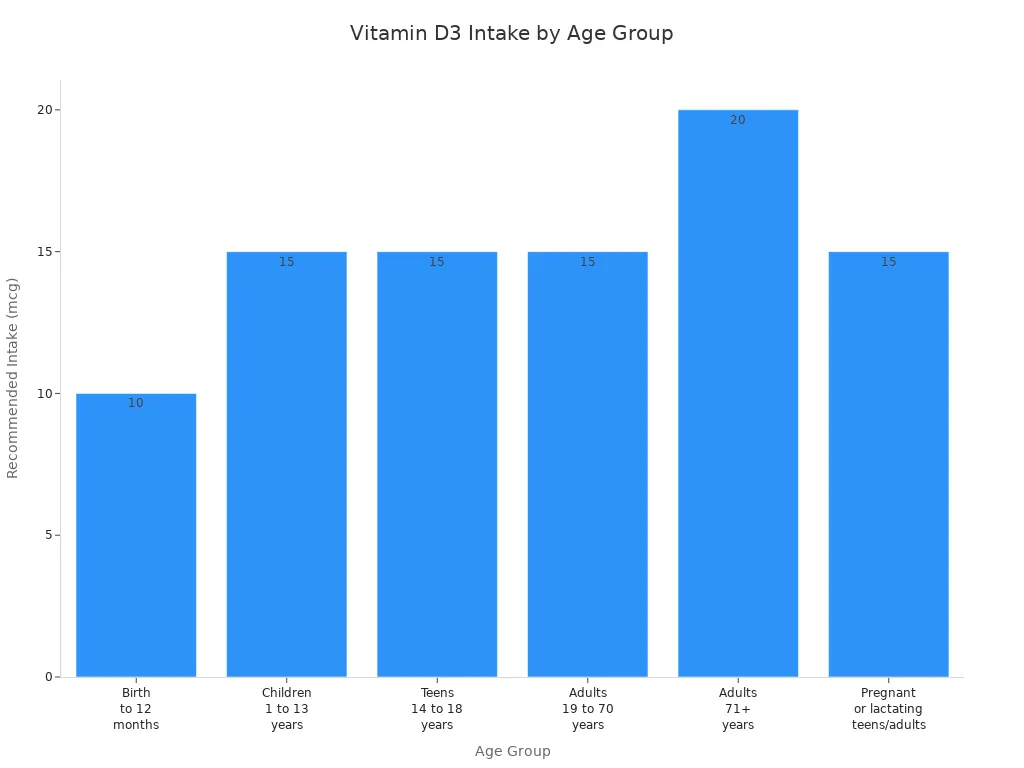
📝 Note: Getting enough vitamin D3 is easy with sunlight, food, or supplements. If you are not sure you get enough, talk to your doctor.
Vitamin D3 from Lichen
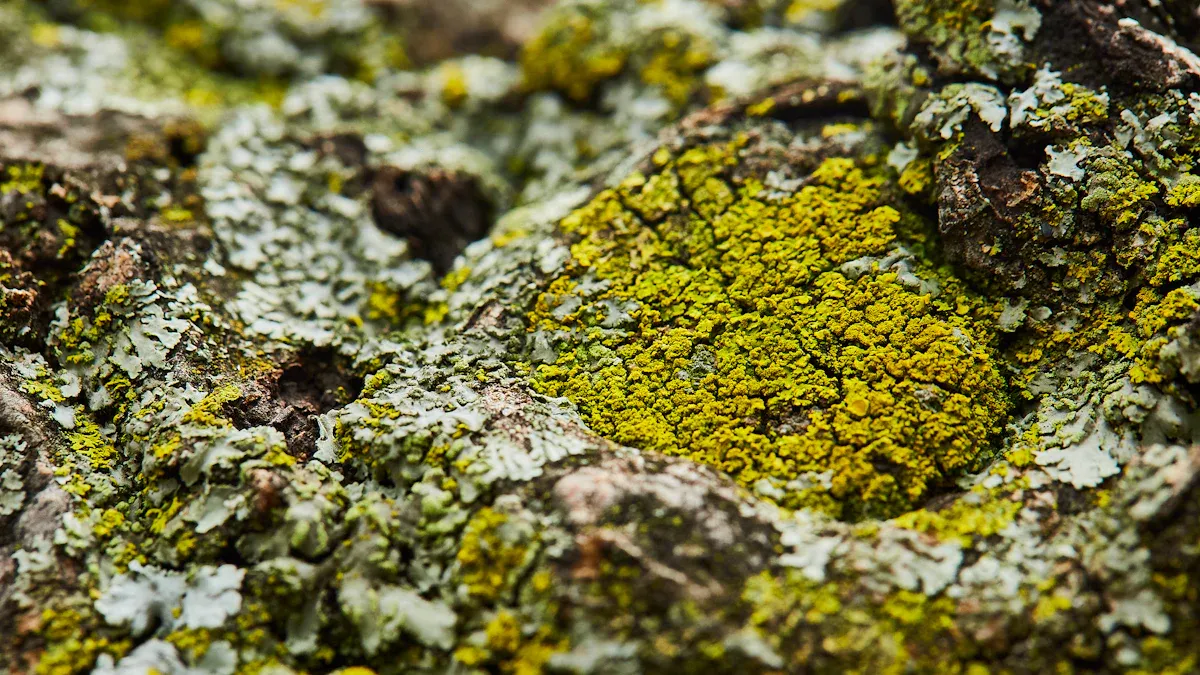
Source and Production
You might wonder how vitamin d3 from lichen ends up in your supplement bottle. The process starts with special types of lichen and algae. These organisms grow in clean, controlled environments. This helps them stay healthy and full of nutrients. Here’s how companies make sure you get pure and strong vitamin d3 from lichen:
- They grow lichen and algae in special places where they can control light, water, and temperature.
- After harvesting, they use safe solvents to pull out the vitamin D3 from the lichen.
- The vitamin D3 goes through more steps to make sure it is pure and meets strength standards.
This careful process means you get a supplement that is both safe and effective. You can trust that the vitamin d3 from lichen in your bottle is clean and ready to help your body.
Vegan and Sustainable Benefits
If you care about animals and the planet, vitamin d3 from lichen is a smart choice. Lichen grows naturally in many places and does not need animal farming. This makes it a true vegan vitamin d3. You also help the environment because lichen is easy to grow and harvest without harming nature.
Check out this table to see why vitamin d3 from lichen stands out:
| Evidence Type | Description |
|---|---|
| Natural Abundance | Lichen grows in the wild and feeds animals like reindeer and caribou. |
| Non-GMO Status | Lichen is naturally non-GMO, perfect for vegan diets. |
| IUCN Red List Classification | Lichen is not endangered, so harvesting is safe for the environment. |
| Historical Use | People have used lichen for food and medicine for a long time. |
You also get peace of mind because rules for vegan vitamin d3 are getting stronger. Companies must follow strict rules about labels and health claims. Governments want to make sure you know what you are buying. They check that products are safe, truly vegan, and made in a way that protects the planet.
🌱 Tip: If you want a supplement that matches your values and helps the earth, vitamin d3 from lichen is a great pick.
Cholecalciferol
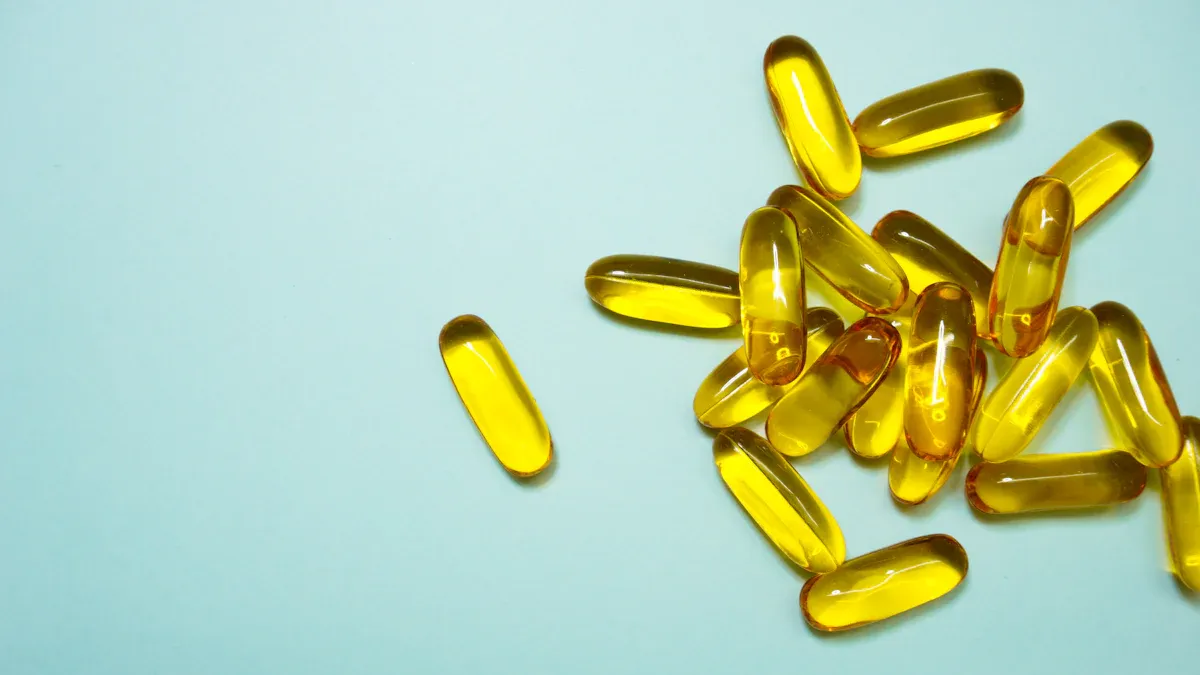
Animal-Derived Sources
You might see cholecalciferol listed on many supplement bottles. Most of the time, companies make it from animal sources. The most common way uses lanolin, which comes from sheep’s wool. Makers extract a substance called 7-dehydrocholesterol from the lanolin. Then, they shine UV light on it to turn it into cholecalciferol. This process gives you the same type of vitamin D3 your body makes from sunlight.
Here’s a quick look at the main sources and how they get processed:
| Animal Source | Processing Method |
|---|---|
| Sheep (lanolin) | 7-dehydrocholesterol is extracted from lanolin, then irradiated with UV light. |
| Lichens | Processed for cholecalciferol suitable for vegans. |
Most cholecalciferol you find in stores comes from sheep’s wool. If you follow a vegan diet, you might want to check the label. Some brands now use lichen, but this is less common.
🐑 Tip: If you want to avoid animal products, always look for the source of cholecalciferol on the supplement label.
Common Uses
You will find cholecalciferol in many foods and supplements. Companies add it to foods to help people get enough vitamin D3. Here are some places you might see it:
- Animal foods
- Fortified fats and spreads
You can also spot cholecalciferol in many dairy products and plant-based drinks:
- Milk (low fat, fat free)
- Yogurt (plain, nonfat, low fat)
- Cheese (American, low fat or fat free)
- Fortified soy beverage (soy milk)
Other foods often have added cholecalciferol, too:
- Fluid milk
- Acidified milk
- Cultured milk
- Nonfat dry milk
- Evaporated milk
- Margarine
- Calcium fortified juices and drinks
When you shop for supplements, you will see cholecalciferol in many forms. Here’s a table to help you compare:
| Form | Description |
|---|---|
| Capsule | Standard form for oral intake |
| Gel Capsule | Soft gel form for easier swallowing |
| Chewable Gel (Gummy) | Tasty option for easier consumption |
| Tablet | Common solid form for oral intake |
| Liquid Drops | Flexible dosing option for children |
You can pick the form that works best for you. Some people like gummies, while others prefer drops or tablets. Cholecalciferol is easy to find and comes in many choices.
Effectiveness and Absorption
Bioavailability
When you pick a vitamin D supplement, you want to know if your body can use it well. This is called bioavailability. The bioavailability of vitamin d3 is high, no matter if it comes from lichen or from animal sources like lanolin. Your body absorbs both types in almost the same way. Once you take the supplement, your body turns vitamin D3 into a form it can use to keep your bones and immune system strong.
You might wonder if lichen-based D3 works as well as the animal-based kind. Good news! Studies show that both types raise your vitamin D levels in your blood just as well. Your body does not care if the D3 comes from a plant or an animal. It uses both in the same way.
🧬 Did you know? Your body absorbs vitamin D3 better than vitamin D2. This means you get more health benefits from D3, no matter the source.
Scientific Evidence
Scientists have tested how well different types of vitamin D work in your body. They looked at how much your blood levels go up after you take vitamin D2 or D3. The results are clear: vitamin D3 is better at raising your vitamin D levels than vitamin D2.
Here is a table that shows what happens when people take D2 or D3:
| Vitamin Type | Initial 25(OH)D (nmol/L) | Final 25(OH)D (nmol/L) | Increase (nmol/L) |
|---|---|---|---|
| D2 | 43.7 ± 17.7 | 57.4 ± 13.0 | 13.7 ± 11.4 |
| D3 | 41.3 ± 17.7 | 64.6 ± 17.2 | 23.3 ± 15.7 |
You can see that D3 raises your vitamin D levels almost twice as much as D2. This means you get more benefit from vitamin d3 supplements.
Another study compared how much your vitamin D levels change with D2 and D3. Here is what they found:
| Study Type | Vitamin Type | Change in 25(OH)D (nmol/L) | Confidence Interval | P-value |
|---|---|---|---|---|
| Comparative | D2 | 10.39 lower | −14.62, −6.16 | < 0.0001 |
| Comparative | D3 | – | – | – |
This table shows that D3 is much better at raising your vitamin D levels than D2. The difference is big and real.
You might also want to know if the amount you take matters. Scientists tested different doses and found that D3 always works better than D2, even at high or low doses:
| Dosage (IU) | Vitamin Type | Serum 25D Levels | Result |
|---|---|---|---|
| 50,000 IU | D2 | Lower than D3 | – |
| 50,000 IU | D3 | Higher than D2 | – |
| 2000 IU | D3 | Higher than D2 | – |
| 4000 IU | D3 | Higher than D2 | – |
No matter the dose, D3 gives you a bigger boost in your vitamin D levels.
📈 Tip: If you want the best results, choose vitamin D3 instead of D2. Both lichen-based and animal-based D3 work well, so you can pick the one that fits your values and needs.
Who Should Choose Which?
Dietary Preferences
Your diet plays a big role in choosing the right vitamin D3. If you follow a vegan or vegetarian lifestyle, you want to avoid animal products. Lichen-derived vitamin D3 fits your needs because it comes from a plant-like source, not animals. Most traditional cholecalciferol comes from lanolin in sheep’s wool or fish oil. This makes it off-limits for vegans and many vegetarians.
You might see different types of vitamin D on supplement labels. Here’s a quick guide:
- Vitamin D2 (ergocalciferol): Comes from plants.
- Vitamin D3 (cholecalciferol): Usually from animal sources like lanolin or fish oil.
- Vegan vitamin D3: Made from lichens, perfect for plant-based diets.
If you want to stick to your dietary values, always check the label for the source. Lichen-based D3 gives you peace of mind and matches your lifestyle.
Allergies and Sensitivities
Some people have allergies or sensitivities that affect their supplement choices. If you have a wool allergy, you might react to cholecalciferol from lanolin. Lichen-based vitamin D3 does not use animal products, so it is a safer choice for you if you have these concerns.
You may also want to watch for extra ingredients in supplements. Some brands add fillers, colors, or preservatives. If you have food allergies, look for products with simple ingredient lists. The best options use only the active vitamin D3 and a few safe extras.
📝 Tip: Always read the ingredient list if you have allergies. Lichen-based D3 is often cleaner and less likely to cause problems.
Ethical and Environmental Concerns
You might care about how your supplements affect the planet. Many people now look for products that match their values. Lichen-based vitamin D3 stands out for its eco-friendly and ethical benefits. It does not rely on animal farming, which can harm the environment.
Organic farming helps the earth by improving soil, saving water, and protecting wildlife. Brands that use organic and vegan practices often support biodiversity and avoid harmful chemicals. You can help the planet by choosing these products.
Here’s what you can do to make an ethical choice:
- Look for organic and vegan certifications on the label.
- Pick supplements with simple, clean ingredients.
- Check if the brand shares information about their sustainability and fair labor practices.
You make a difference with every purchase. Choosing lichen-based vitamin D3 supports your health and the world around you.
Making Your Choice
Practical Tips
Choosing the right vitamin D3 supplement can feel confusing, but you can make it easier by focusing on a few key things. Start by thinking about your own needs and lifestyle. Here are some practical tips to help you decide:
- Check your current vitamin D levels. A simple blood test from your doctor can show if you need a supplement.
- Think about any health conditions or medicines you take. Some health issues or drugs can change how your body uses vitamin D.
- Look at your diet. If you eat only plant foods, lichen-based vitamin D3 fits your needs. If you eat animal products, you have more options.
- Pick a form you like. You can find vitamin D3 as capsules, gummies, drops, or tablets. Choose what feels easiest for you to take every day.
- Check the absorption rate. Both lichen and animal-based D3 absorb well, but always read the label for extra info.
- Look for extra ingredients that might help, like added calcium or magnesium.
- Buy from brands you trust. Good companies use third-party testing to make sure their supplements are safe and strong.
📝 Tip: Always read the label and look for certifications like vegan, organic, or non-GMO if those matter to you.
Consulting a Professional
You might still have questions about which vitamin D3 source is best for you. Talking to a healthcare professional can help you feel confident in your choice. Doctors and dietitians often look at your diet, health, and lifestyle before giving advice. They may also suggest certain foods or supplements based on your needs.
Here’s a quick look at common food sources and the type of vitamin D they provide:
| Food Source | Type of Vitamin D | Notes |
|---|---|---|
| Cod liver oil | D3 | Rich source of vitamin D3 |
| Salmon | D3 | Fatty fish, high in vitamin D3 |
| Swordfish | D3 | Another fatty fish source |
| Tuna fish | D3 | Commonly consumed, good source |
| Orange juice (fortified) | D2 | Fortified option for non-fish eaters |
| Dairy and plant milks (fortified) | D2 | Widely available fortified options |
| Sardines | D3 | Small fish, also high in vitamin D3 |
| Beef liver | D3 | Nutrient-dense source |
| Egg yolk | D3 | Contains smaller amounts of vitamin D3 |
| Fortified cereals | D2 | Common breakfast option |
If you feel unsure, ask your doctor or a registered dietitian. They can help you pick the best supplement or food source for your health and values. Sometimes, a simple chat can make all the difference.
You now know the key differences between vitamin D3 from lichen and cholecalciferol. Lichen-based D3 is vegan and kind to animals, while cholecalciferol comes from lanolin in sheep’s wool. Both offer high bioavailability. Here’s a quick look:
| Aspect | Vitamin D3 from Lichen | Cholecalciferol (Lanolin) |
|---|---|---|
| Source | Vegan (Lichen) | Animal-derived (Lanolin) |
| Bioavailability | High | High |
| Ethical Considerations | No animal harm | Potential animal harm |
Think about your health goals, values, and current vitamin D levels. If you’re unsure, check this chart for daily dosage guidance:
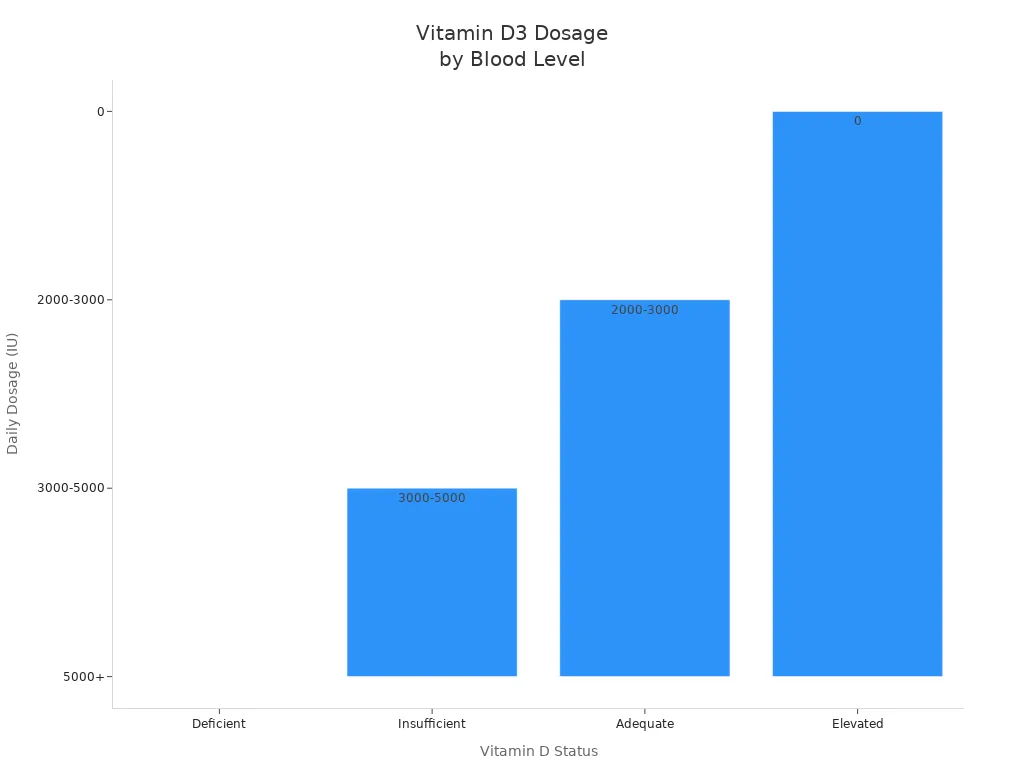
📝 Always read supplement labels and look for third-party testing. If you have questions, talk with your healthcare provider. Choose what fits you best, balancing science with your personal preferences.
FAQ
Can you get enough vitamin D3 from sunlight alone?
You can get vitamin D3 from sunlight, but it depends on where you live and how much time you spend outside. In winter or if you wear sunscreen, you might need a supplement.
Is lichen-based vitamin D3 safe for kids?
Yes, lichen-based vitamin D3 is safe for kids. Just make sure you follow the dosage on the label or ask your doctor for advice.
Does lichen-based D3 work as well as animal-based D3?
Yes! Your body absorbs both types the same way. Studies show lichen-based D3 raises your vitamin D levels just like animal-based D3.
Are there any side effects from taking vitamin D3 supplements?
Most people do not have side effects if they take the right amount. Taking too much can cause problems like nausea or headaches. Always follow the recommended dose.
How do I know if my vitamin D3 supplement is vegan?
Look for labels that say “vegan” or “plant-based.” You can also check the ingredient list for lichen as the source. If you are unsure, ask the company or your pharmacist.

Poseidon
Master of Nutritional Epidemiology, University of Copenhagen, Herbal Functional Nutrition Researcher
Focus: The scientific application of natural active ingredients such as Tongo Ali, Horny Goat Weed, and Maca to sexual health and metabolic regulation.
Core Focus:
Men: Use a combination of Tongo Ali (an energizing factor) + Maca (an energy reserve) to improve low energy and fluctuating libido.
Women: Use a combination of Horny Goat Weed (a gentle regulator) + Maca (a nutritional synergist) to alleviate low libido and hormonal imbalances.
Stressed/Middle-Aged Adults: This triple-ingredient synergy supports metabolism, physical strength, and intimacy.
Product Concept:
Based on traditional applications and modern research (e.g., Tongo Ali promotes testosterone-enhancing enzyme activity, and icariin provides gentle regulation), we preserve core active ingredients and eschew conceptual packaging—using natural ingredients to address specific needs.
Simply put: I'm a nutritionist who understands "herbal actives." I use scientifically proven ingredients like Tongo Ali, Epimedium, and Maca to help you make "sexual health" and "nutritional support" a daily routine.
